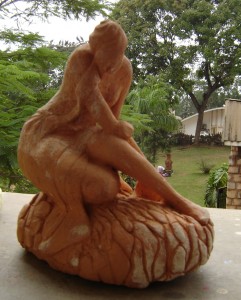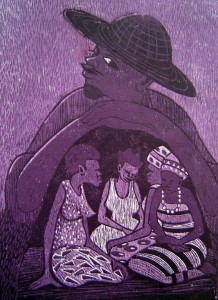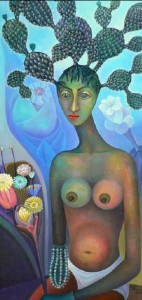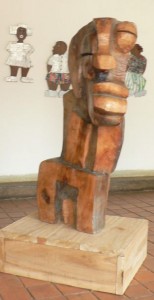In her dissertational thesis Art and gender. Imag[in]ing the new woman in contemporary Ugandan art Amanda Tumusiime has investigated the tendency in Ugandan art to define and construct men and women in such a way as to match them with patriarchal confines. In the complex Ugandan society the character of women is described on the basis of two categories, the good woman and the bad woman. This categorisation defines the good woman as the one who stays at home and resides in the countryside and the bad woman as the one who stays in an urban environment and works in a public space.
The bad woman theme tends to hold vast possibilities. Titles such as Prostitutes, Gold Diggers, Vectors of HIV-AIDS, and Striptease are common. Musangogwantamu, for instance, claims that urban women are materialistic and are full of lust. Francis Ifee who was a student of Musango’s in the 1980s and currently a lecturer portrays modern women as prostitutes, and Godfrey Banadda with his Dare to touch (2009) constructs women as vectors of HIV-AIDS.
Female artists, such as Lillian Nabulime, Rebeeca Bisaso, Maria Naita and Alex Baine, have taken up themes that emancipate women, for example works such as Women’s emancipation of women (1989). And as if to respond to the domineering conceit of patriarchy, Nabulime amplifies her attack on machismo in Man and Sebbo (2011). Man is presented as a half a man, half a woman. According to the artist man is curved that way to show that he is less of a man. Sebbo is a Luganda word which literally means ‘sir’. Nabulime argues that the sculpture Sebbo reflects a “patriarchal society we live in. Men are dominant and usually take control of decisions. They give an impression of fearless, aggressive, powerful prestige, yet it may not be the case” (Nabulime 2011: 16). Some female musicians have made similar remarks. For instance, Titi Tendo, a female artiste, came up with a song called Selwanga, which literally means a cock which does not crow. In Uganda the debate on gender perspectives in contemporary art is new and opens up vast possibilities.
Tags: Female stereotypes, Machismo, Patriarchy






 Die
Die
Am 4. January 2014 um 11:11 Uhr
According to Amanda, in her thesis “Art and gender. Imagining the new woman in contemporary Uganda art” women are described in two categories bad and good. A good one being one who stays home and in the country side but the bad woman is described by many artists as one who stays in urban centers. Like some have called the urban woman as being prostitutes, gold diggers, vectors of of HIV/AIDS and such artists like Ifee Francis, Banadda have some negative art impression of what a woman should be like. In counter reformation, Amanda suggests of female artists like Nabulime Lillian who have presented woman as half man and half woman analysing that a woman is equal to man and thus should not be despised in the role of art practice in society.
Am 4. January 2014 um 14:19 Uhr
This shows the comparison between the period before the women emancipation and after in a way before women were taken as inferior human beings while men considered themselves to be superior in a way that their word was final. Women were not allowed to chair meetings or even to take up positons of leadership. After women fighting for their rights we see that today women are given freedom to participate in politics. Some women have even proved to be more superior than men in a way that they are hard working and innovative. This has promoted gender balance to the society thus promoting development.
Am 4. January 2014 um 16:28 Uhr
From the passage, it is clearly shown that women are treated inferior to men through the art practices, as some of the lecturers’ works reflect women only on the bad side, which is dangerous since they still lecture as this can create gender insensitive graduates.
Further still, it is observed from the passage that the female artists (lecturers) have struggled and still struggle through the works of their hands to respond to issues like patriarchy as opposed to their counter parts the male lecturers (artists) who create works which continuously deepen and widen the imbalance between both genders by always showing men as superiors and righteous as compared to women.
In the final analysis, there are efforts in place to sensitize the students community about such gender issues as this is done through the gender studies which is part of the school curriculum. However still a lot more is needed. For example, gender studies should be taught for at least two semesters to increase awareness to students, and also themes through which art works are developed should address some of the gender issues in a positive way since such art works are taken to the market and they are intended to communicate and teach the public.
Am 4. January 2014 um 22:32 Uhr
Gender in Uganda is still a roaring debate and is still unfair to the women. I think that gender perspectives can be or better still are a big influence to many contemporary artists in Uganda. This in turn can be a very useful way to educate Ugandans and the world through art about gender, gender equality and inequality. The thesis reminds me so much about the gender inequality in Uganda and how many people think about the rural and urban woman and how many people have come up to fight for women in Uganda through educating the girl child to see that women get equal opportunities as the men. The fact that is a very big issue in Uganda and that many people have grown up in the gender biased Uganda many contemporary artists have been influence in their art by this concept and many who have come to appreciate gender equality have used their art to give their views and opinions about gender issues.
Am 5. January 2014 um 15:23 Uhr
“Modern women are prostitutes” as stated by Mr.Francis Ifee. I totally disagree with that statement because not all modern women engage in prostitution. There are women who have stood out in our communities and have caused positive impacts in our society both economically, socially and politically for example the likes of The Right Honorable Speaker of Parliament Rebecca Kadaga who of late stood up against homosexuality, Mrs. Jennifer Musis who has brought about positive changes in the city of Kampala by spear heading innovations, renovations and development of new infrastructures such as roads, the Wandegeya market among others. I therefore conclude by disagreeing with Mr. Francis Ifee that not all women are prostitutes.
Am 6. January 2014 um 06:41 Uhr
I would agree with Mr. Francis Ifee where he attributes women to being prostitutes which is relatively true because when you go through the streets of Wandegeya, Speak road, Opposite Top pub and many other places you would find quite alarge number of women engaging in prostitution which confirms Mr. Ifee’s arguement. In addition to being prostitutes Mr. Banada states that women are “vectors of HIV/AIDS” which directly connects with prostitution since prostitutes sleep with different me who some or even all do not use protection (condoms). On the contrary some women have come out and taken good positions in the community economically, socially and politically like Hon. Rebbecca Kadaga who is the speaker of paliament, Madam Miria Matembe, Maggie Kigozi and more fighting against prostitution.
Am 6. January 2014 um 13:04 Uhr
GOD THE OVERALL CREATED MAN AND WOMAN EQUAL
In genesis 1:27 so God created man in his own image, he created him, male and female he created them.
In corinthians 11:12 for as woman was made from man so man is now born of woman and all things are from God.
And galatians 3:28 there is neither Jew nor Greek, there is neither slave nor free, there is no male or female, for you are all one in christ Jesus.
Now where does the superiority of man come from? Today there are men who are GOLD DIGGERS, if you watch BUKEDDE TV in the programme ABANOONYA, men are searching for women who have money, so isn’t that being materialistic …
Therefore women we need to stand up and fight the super imposed superiority of these men.
Nanfuka Joan
Am 6. January 2014 um 19:46 Uhr
The thesis reminds me so much about the gender inequality in Uganda.
From the passage, it is clearly shown that women are treated inferior to men through the art practices, as some of the lecturers’ works reflect women only on the bad side, which is dangerous since they still lecture as this can create gender insensitive graduates.
It is also observed from the passage that the female artists have struggled and still struggle through the works of their hands to respond to issues like patriarchy as opposed to their counter parts the male artists who create works which continuously deepen and widen the imbalance between both genders by always showing men as superiors and righteous as compared to women.
Am 7. January 2014 um 09:10 Uhr
According to Amanda’s thesis Art and gender, its clearly shown that women are treated inferior to men through the different art practise.
This in conclusion can lead to gender insensitive graduates because most of the lecturers art works reflect women only on a bad side and this is dangerous and these are the examples students depend on as inspirations.
In conclusion their are different ways of sensitising students and community about such gender issues and one of them is through genders studies which is even one of the core course at university, organising workshops and exihibitions with themes of gender education among others. The thesis also on the other hand reminds about the gender in equality in Uganda, how people think about rural and urban women and also how people are coming up to fight this Uganda.
Am 7. January 2014 um 16:42 Uhr
William totally disagree with the issue of categorizing women as good and bad women because we are all made in GOD’s image which shows we are all equal and it is just a matter of understanding one another. Most women are put to sit at home only to do domestic work which is never constructive to the development and betterment of their lives and the country at large and this has made the put their talents to a waste, so many women who are referred to as the good ones in Amanda Tumusiime’s thesis of “Art and gender” are the women who cannot even take their families onto the next level in case a man who was the only decision maker and straggler passes away.
Women do not engage themselves in prostitution because of their will but it is because of some men who do not want to take on their responsibility after getting the women pregnant and in the end it forces some ladies with out work to engage in the act. So, I conclude by saying that:
SOME MEN FEAR WATCHING WOMEN PROSPER BECAUSE THEY THINK IT WILL BE DIFFICULT FOR WOMEN TO RESPECT THEM.
Kizza William
Am 7. January 2014 um 17:09 Uhr
The first point to note is women being considered as vectors of AIDS as depicted by Banadda in his painting ‘dare to touch’ is totally inconsiderable because it cuts across to both men and women. For instance, men have a belief that once your are circumcised you cannot contract the disease putting the blame to women yet they are also carriers or the HIV from on partner to another […]. Therefore the blame should be on both parties since every one is a carrier.
Another issue to note is based on the categorization of good and bad woman in Uganda. I think there is no bad woman and good woman, they are all women and this is a changing world where we have so many cases of single parents who have to work and take care of the family. It would be a disservice to the children if the woman stays home instead of taking on the opportunity to work in public and urban environment. Yet, this environment exposes them to the competitive job world. Hence awakening the hidden talents in them which can even make the more respectable and prominent in the contemporary Uganda. So in conclusion, women should come up and work or engage themselves in the available working environments be it urban or rural for their betterment.
Am 8. January 2014 um 09:53 Uhr
Another issue that arises from the below is failure to take on the family in case the man who was the only bread winner passes away and since the so called good woman had nothing put up in place but herself the family can crumble down because many people from the man’s side may also want the relative’s business as it is mostly in our contemporary Uganda today and in that case she may stay penniless. And one good example or several can be gotten from the media stations where women are evidently shown on news like the “agatalikonfufu” suffering with the children as the family members on the side of the man take on the properties of the deceased and it is this kind of situations that tend to force the women to engage them self into prostitution hence making them look bad to the public. The thing of saying that urban women are prostitutes is just a mere excuse by some men who fear watching their women prosper thinking that they will not respect them like the other women who do not work.
Am 8. January 2014 um 10:29 Uhr
This has become a lively and very interesting debate especially for me as a reseacher on art and gender issues from a country were women are a natural part of the working environment but are still treated disparately at times when it comes to payment, for example. I personally think that you cannot afford dismissing the talents, work force and specific perspectives of any adult member of a society no matter what gender, class, religion or sexual orientation as many of you have argued. Only many perspectives and approaches can solve today’s political, economic and cultural problems. Art can serve as a catalyst here to address those issues. I would be interested in the question of visual expressions in art or the media that actually mediate an alternative and positive image of women who are struggling, working, contributing to society …
Am 15. January 2014 um 05:06 Uhr
The generational gap between women in the rural and urban as said by Ms Amanda Tumusiime clearly shows their different perspective, views, and hopes. To me however, urban women are learning to be real, meaning that they are confidently living by their personal standards and demanding the respect they deserve. On the other side rural women are still trapped in the African traditional rurals and yet men do less but are still superior. In conclusion, due high levels of education urban women are consistently living up to the standards of living and that’s why rural women are migrating to urban areas.
Am 20. January 2014 um 16:28 Uhr
In this dissertation thesis Art and Gender, an investigation was made under the tendency to define and construct men and women in order to match them with patriarchal confines as far as Ugandan art is concerned. According to me this thesis shows that female artists portray a negative attitude towards the male sex, this is shown for example through Lady Titi Tabel currently a worker on NBS television whereby she sang a song titled Sseggwanga trying to communicate the bad ways of a man and his responsibility which relatively matches with male artists work by the names of Mr. Banadda Godfrey currently a lecturer at the school of fine art Makerere University who constructs a woman as a vector of HIV.AIDS in his painting of Dare to Touch hence portraying a character of negativity towards women.
Am 6. April 2014 um 16:54 Uhr
According to the art work, the art work portrays the struggle for women to be independent from men. The work also shows the struggle for women’s emancipation especially in the second the painting of women under a man with a cap. One of the art work shows the beauty of African women. According to me, what should have been added on especially in the nude painting is include more of the brown chocolate colour to the painting to emphasise African characteristics. All in all it’s beautiful art work and I highly appreciate the great work Amanda Tumusiime has done.
Am 30. April 2014 um 07:42 Uhr
Dr. Amanda was right to describe the character of women in those two categories she mentioned thus good woman and bad woman. According to her its true, but I disagree with the way she defines the good and bad woman. According to her, the good woman stays home and resides in the country side and the bad woman is the one who stays in an urban environment and works in a public place. To a smaller extent it is right. However it could be the opposite, this is to say a good woman could be the one who lives in an urban environment and works in a public place at the same time be a holy Christian preaching the gospel. While a bad woman could be the one who resides in a country side and stays home doing evil things like witchcraft and having an evil mind.
Am 3. February 2023 um 07:02 Uhr
It is very good information about some myths regarding the curing of both HIV and hepatitis C infection. It was somewhat useful for many including me. It is a must-read blog to explore the new info about HIV and hepatitis C infection curable medicines. Keep it posting these kinds of informative blogs in the future!
Am 21. September 2023 um 11:12 Uhr
Do you believe that the exploration of gender in art has the potential to influence social perceptions and attitudes toward gender roles in Ugandan society? If so, how? we have alot of colection in FIK
Am 18. November 2023 um 17:58 Uhr
This site truly has all of the info I wanted about this subject and didn’t know who to
ask.
Am 30. November 2023 um 04:28 Uhr
Diese Website enthält wirklich alle Informationen, die ich brauchte, und ich retro bowl hatte keine Ahnung, a wen ich fragen sollte.
Am 11. January 2024 um 04:29 Uhr
I spent many hours challenging myself and improving my Drift Hunters skills in this game.
Am 1. October 2024 um 07:15 Uhr
Impressive article, packed with Geometry Dash Wave valuable information.